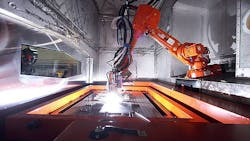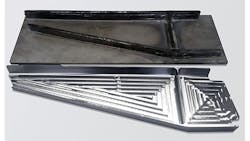3D Printing Titanium for Jet Structures Shows 'Excellent Results'
Norsk Titanium’s 3D-printing technology has been used by an Airbus subsidiary to produce structural components for the jet builder’s A350 XWB wide-body aircraft, in Ti-6Al-4V (the most commonly used titanium alloy in industrial applications, sometimes known as Ti64.) Norsk Titanium (NTi) produced the sample parts using its Rapid Plasma Deposition™ (RPD) technology, which were finish machined (“with excellent results,” according to NTi) by Premium Aerotech at its Varel, Germany, plant.
These parts now are being subjected to “stringent engineering analysis” by Premium Aerotech. The results will be used NTi and Premium Aerotec jointly in a plan to qualify the process for industrial application.
“We ordered samples of two of our proprietary Airbus A350 XWB parts and were pleasantly surprised how quickly they arrived and how efficiently we were able to machine Norsk’s near-net-shape RPD™ components into finished test pieces,” stated Dr. Joachim Schmidt, head of parts production at Varel.
Premium Aerotech is a tier-one supplier of titanium and carbon fiber composite structural parts to Airbus, with four plants in Germany and one in Romania. It produces metal structures for all Airbus commercial aircraft models, as well as for the A400M turboprop military transport and the Boeing 737. For the A350 XWB it produces CFC fuselage shells and sections, wing components, floor structures, the pressure bulkhead, and the main landing gear attachment.
The company also supplies the pressure bulkhead and titanium components for the Boeing 787 Dreamliner.
Norsk Titanium’s (RPD™) process is a direct metal deposition technology: within an argon atmosphere, powder metal alloys are deposited according to a CAD design pattern, then converted into solid material by laser, eventually forming the finished part. RPD is capable of depositing the material in six axes of operation, and of depositing multiple materials for parts with highly complex geometries.
“This fast-track qualification program is a great example of the value proposition RPD™ brings to our commercial aerospace partners,” stated Norsk Titanium chief commercial officer Chet Fuller. “We turned Aerotec’s 3D CATIA files into flyable titanium parts in a matter of weeks under a cost reduction effort that could ultimately save Airbus $2-$3 million per aircraft.”
NTi produces aerospace-grade titanium structures at a plant in Hønefoss, Norway, though it has been associated with plans for a $125-million, 200,000-sq.ft. project in Plattsburgh, NY, at the SUNY Polytechnic Institute, that NTi would operate in a public-private partnership. That that operation would have several dozen additive manufacturing systems in operation, producing aerospace and defense-related parts.
Alcoa is a minority investor in NTi by way of its acquisition of RTI International last year. RTI invested an undisclosed amount in NTi to cooperate on projects surrounding NTi’s 3D printing technology. Last fall, Alcoa and NTi agreed to conduct joint industrial research to identify opportunities in additive manufacturing that will result in products for aerospace, defense, energy, automotive, and maritime industries.
Foundry Management & Technology is an IndustryWeek companion site within Penton's Manufacturing & Supply Chain Group.
About the Author
Robert Brooks
Content Director
Robert Brooks has been a business-to-business reporter, writer, editor, and columnist for more than 20 years, specializing in the primary metal and basic manufacturing industries. His work has covered a wide range of topics, including process technology, resource development, material selection, product design, workforce development, and industrial market strategies, among others. Currently, he specializes in subjects related to metal component and product design, development, and manufacturing — including castings, forgings, machined parts, and fabrications.
Brooks is a graduate of Kenyon College (B.A. English, Political Science) and Emory University (M.A. English.)

